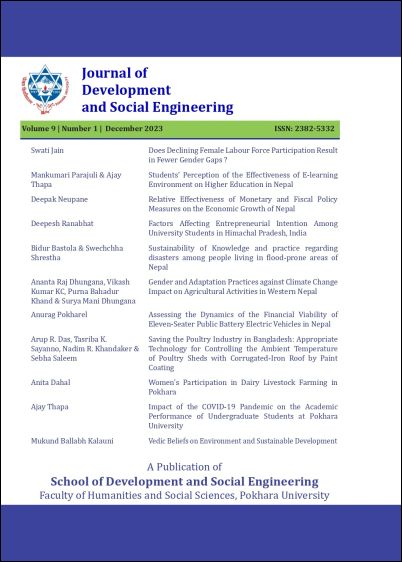Vedic Beliefs on Environment and Sustainable Development
DOI:
https://doi.org/10.3126/jdse.v9i01.70613Keywords:
Upanishads, Sustainable Development, Vedas, Environment, Vedic BeliefsAbstract
Sustainable development means creating an environment that is necessary for humans without disturbing the nature. The concept of sustainable development emerged when in the name of progress nature was being destroyed, often neglecting the wisdom passed down from our ancestors. The objective of this research paper is to explain the Vedic knowledge in the context of the sustainable development as a modern concept and to find the facts related to environment and development. The research is qualitatively designed using available secondary sources of information and knowledge of Vedas, Upanishads, Purans and Niti Sholkas related to environment and sustainable development. To make it more informative, interviews were carried out with key informants as primary sources of data. As mentioned in the Atharvaved, earth is assumed as mother and all creatures are her children, which showed the positive attitude of environment protection. The emphasis on the purity and protection of river, jungle and air needs to be revived and only then the concept of sustainable development can be meaningful. Vedic literature will be much useful to understand the concept of development in a comprehensive way. It is notable fact that the earth is useful for humans as well as for all creatures of the world and for the whole universe. Only the way to protect the universe from tensions, pollutions, war and conflicts is Vedic concept that regards the universe as a family. Only by incorporating Vedic knowledge into the concept of modern development can we meet the standards of sustainable development.
Downloads
Downloads
Published
How to Cite
Issue
Section
License
Copyright © Journal of Development and Social Engineering, School of Development and Social Engineering, Faculty of Humanities and Social Sciences, Pokhara University. All rights reserved. The School of Development and Social Engineering, Pokhara University holds the exclusive copyright of all the contents of this journal. No part of this journal may be reproduced or transmitted by any media or publishing organizations including websites without the written permission of the copyright holder. The contents of this journal are available for any citation, using a recognized and proper referencing system.




